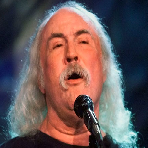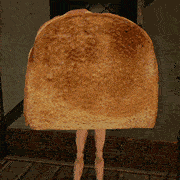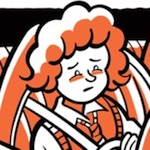|
A human heart posted:I am reading a book from 1909 called 'Literary Taste - How to Form It' which might be useful for some of the posters in here Lmao I'm reading Kafka again and it kicks big rear end. It's cool to get older, have more frequent nightmares and feelings of inadequacy + imagine the world is out to get you, and then find these sentiments perfectly articulated by a genius.
|
|
|
|

|
| # ? May 5, 2024 06:00 |
|
CestMoi posted:You say it's literally a disease twice but it's absolutely not that clear cut. We generally know what causes diseases, we can point to specific problems in a body that have lead to the disease. We can say exactly what the disease is affecting in the body, we can suggest treatments that specifically target what has gone wrong, and alleviate the symptoms (obvs not true for all diseases, just generally true in physical 100% just your body, we don't need to worry about your mind diseases). We can't do that with depression, wwe don't know why it happens, we don't know exactly what it affects other than making you depressed, our treatment for it is generally based around serotonin but we're not sure about the exact neurological pathways we're meant to be helping it just seems to work relatively often. This kind of vagueness means there is a lot of scope for misdiagnosis and misprescription, both of which can lead to addiction. You don't understand pathology, pharmacology, or psychiatry and need to stop making a fool of yourself. Addiction is not the same as dependence and you are grossly confusing the two. No medical person would call the physical dependence/withdrawal effects of an antidepressant "addiction." As for IJ, I think that it is much easier if you understand medicine, addiction, Boston, and tennis. Having experience with everything but tennis made it much easier to read so I got to enjoy amazing descriptions of cravings, depression, withdrawal, etc. I think that some of the chapters/passages should be read in medical school/social work school to help people wrap their heads around what people are going through mentally. And then there's all the wacky hijinks which remind me a bit of Pynchon.
|
|
|
|
Invicta{HOG}, M.D. posted:As for IJ, I think that it is much easier if you understand medicine, addiction, Boston, and tennis. Having experience with everything but tennis made it much easier to read so I got to enjoy amazing descriptions of cravings, depression, withdrawal, etc. I think that some of the chapters/passages should be read in medical school/social work school to help people wrap their heads around what people are going through mentally. And then there's all the wacky hijinks which remind me a bit of Pynchon. Yeah, I always felt that IJ didn't deal with the issue of addiction alone so much as it dealt with the battle between rationality and compulsion. His presentations of both depression and addiction both are framed very much as battles in which human rationality is useless against overwhelming physical compulsion. He seems to posit we cannot outsmart our urges. He refutes the idea of depression as "feeling sad." He, brilliantly, frames it as a chemical and cognitive experience wholly separate from ideas of happiness of sadness. You cannot "cure" depression by improving your life, nor can you nullify it by counting your blessing. You cannot rationalize away the physical reality of your brain going to war with you. He seems to have the same ideas about addiction. He acknowledges, in both IJ and other texts, that beating addiction is all about digesting absurd and flawed cliches and clinging to them. He seems to argue that you cannot beat your compulsion for drugs by being rational. You have to give yourself completely to faith in patently absurd mantras, not because they are reasonable or right, but because the act of believing in them makes them work. This is also something we see in other works like his. "How Tracy Austin Broke my Heart" comes to this explicit conclusion. He argues that great athletes are not very rational because great athletes cannot be rational. Rationality is poisonous to physical performance at the highest level. Mel Mudkiper fucked around with this message at 03:56 on Sep 23, 2016 |
|
|
|
Rationality is poisonous in general
|
|
|
|
Invicta{HOG}, M.D. posted:You don't understand pathology, pharmacology, or psychiatry and need to stop making a fool of yourself. Addiction is not the same as dependence and you are grossly confusing the two. No medical person would call the physical dependence/withdrawal effects of an antidepressant "addiction." I understand Boston.
|
|
|
|
Invicta{HOG}, M.D. posted:You don't understand pathology, pharmacology, or psychiatry and need to stop making a fool of yourself. Addiction is not the same as dependence and you are grossly confusing the two. No medical person would call the physical dependence/withdrawal effects of an antidepressant "addiction." I'll quickly clarify that in my language addiction and dependence translate to the exact same word, so it was word misuse on my part.
|
|
|
|
Invicta{HOG}, M.D. posted:You don't understand pathology, pharmacology, or psychiatry and need to stop making a fool of yourself. Addiction is not the same as dependence and you are grossly confusing the two. No medical person would call the physical dependence/withdrawal effects of an antidepressant "addiction." Okay, I've clearly been an utter idiot on this but I have heard both actual legit psychiatry people and clinical psychology people at my uni talk about antidepressannts in terms of both dependence and addiction, but as I said my uni was kind of deep into the anti-psychiatry thing when I was there.
|
|
|
|
Abalieno posted:I'll quickly clarify that in my language addiction and dependence translate to the exact same word, so it was word misuse on my part. I sure hope that in the medical vocabulary this is not the case!
|
|
|
|
Abalieno posted:I'll quickly clarify that in my language addiction and dependence translate to the exact same word, so it was word misuse on my part.
|
|
|
|
"Look at all those water addicts," scoffed the breatharian. "I am pure, and yet I am dying"
|
|
|
|
Invicta{HOG}, M.D. posted:I sure hope that in the medical vocabulary this is not the case! quote:For centuries, the word "addiction" meant being "given over" or devoted to something. However, the 19th century temperance and anti-opium movements used it in a more restrictive way, linking "addiction" to drugs, to illness or vice, and to withdrawal symptoms and tolerance. Both the traditional and restrictive meanings survived into the present. In the ensuing uncertainty about its meaning, some authorities now wish to replace "addiction" with substitute terms like "drug dependence", "substance abuse", etc. We hope to show that the term "addiction" is too valuable to discard. Its traditional sense designates the profoundly important, albeit sometimes harmful, capacity of people to become "given over." On the other hand, the restrictive meaning refers only to a special case, which is defined arbitrarily and inconsistently. It is outmoded because of these problems. The traditional meaning remains useful, but can be improved by clarifying the distinction between "positive" and "negative" addictions originally proposed by Glasser (1976). In my language (Italian) there simply isn't a moral connotation added to the word "addiction". It's always "dependence". So that world doesn't specify one case where dependence is linked to a pleasurable habit that goes critical. There's no distinction in medical terms either. I suppose the context makes it, not the word itself. I wonder if there's actually a factual difference, as the chemical processes involved should be pretty much the same. So the English distinction between addiction and dependence seems to be mostly a description of the history of the habit and the person with the habit, more than a technical difference. I guess English language puts emphasis on whether or not the person had a choice in the process, whereas the Italian word just merely describes the process without passing a judgement on the person. In DFW case there were both aspects. I don't know the "correct" terms, so let's just take the "pleasure" connotation out the picture. On one side he suffered from depression, so he needed constant medication. But that's not the reason why he stopped taking that drug. There was also the other aspect, and that is the "addictive" nature of the type of medication he was using. What I quoted before being "drug sensitization". He was dependent on this drug not only because he needed it for depression, but also because the drug itself is of an "addictive" type. Same as you can use Vicodin because you suffer for pain, but after a while you develop an addiction and you "need" the drug even if you don't feel pain anymore. That specific drug DFW was taking also had an addictive component: after protracted use your body started to physically need it. (if we consider things just in terms of dependence it would work as: depression - drug to treat depression. If then you stop taking the drug, you go back at having depression. This was *NOT* DFW case. His case was: depression - drug to take depression. At this point if he stops taking the drug he's not back at phase 1, but in a much, much WORSE situation, because the original depression is greatly amplified by the withdrawal symptoms caused by the drug itself. These types of drugs aren't a cure, they are temporary band-aids, with the big problem that they make the condition itself much worse over time. Temporary fixes with long term catastrophic results. But sometimes you just don't have a choice.) It's both these things at the same time. Needing constant medication while at the same time using a medication that is addictive. What DFW tried was about stopping using that drug exactly because it was addictive, and he was looking for other types of medications that still worked for his depression WHILE not having also the addictive component. And Science let him down. Abalieno fucked around with this message at 14:08 on Sep 23, 2016 |
|
|
|
Mr. Squishy posted:Oh man I love books about obesity, what's the name may I ask? You Know Me Al - Ring Lardner. The best novel discussed in the past five or so pages
|
|
|
|
Zesty Mordant posted:so far I've laughed most at Charles' failings according to Emma, chief of which was "being unable to explain a horseback riding term she encountered in a novel" lmao the litany expands. turns out Romanticiam stimulates brain damage
|
|
|
|
The most I ever liked Infinite Jest was right after I read it, and every single I have seen it discussed in person or online I have only liked it less
|
|
|
|
hog fat posted:You Know Me Al - Ring Lardner. The best novel discussed in the past five or so pages Are you my great-grandpa?
|
|
|
|
Abalieno posted:I wonder if there's actually a factual difference, as the chemical processes involved should be pretty much the same. So the English distinction between addiction and dependence seems to be mostly a description of the history of the habit and the person with the habit, more than a technical difference. Just checking, is Abalieno trying to argue he understands addiction and its terminology better than an actual for real doctor Mel Mudkiper fucked around with this message at 15:01 on Sep 23, 2016 |
|
|
Abalieno posted:There's no distinction in medical terms either. yes. yes, there is. drugabuse.gov posted:Is there a difference between physical dependence and addiction? WebMD.com posted:Antidepressants are not addictive or habit-forming. Unlike drug withdrawal, antidepressant discontinuation effects are not related to addiction but can reflect physiological consequences of stopping a drug, just as when someone with diabetes stops insulin. can you stop loving posting now, abalieno you don't get to declare that 'science let him down' if you fail to grasp the fundamental meanings of the words you're using, leaving aside the fact that you clearly know jack poo poo about pharmacology or psychiatry. the medication is not addictive, nor are antidepressants (of which there are many kinds besides SSRIs, something you seem to fail completely to understand) 'temporary band-aids' with catastrophic long-term results. that statement is so aggressively wrong that it borders on the offensive. it's almost like you're completely unqualified to be having this discussion e: editing to add this: Anthony Rothschild, MD, professor of psychiatry and director of the Center for Psychopharmacologic Research and Treatment at the University of Massachusetts Medical School in Worcester[/quote posted:If [people on antidepressants of any kind] have a strong family history of depression, or one of those episodes was so severe that their life was impacted significantly in some way, then I would recommend that they stay on medication indefinitely. If not, they could try tapering off after a year and see how they do. But people who have three or more episodes should stay on antidepressants for the rest of their life, as the chance of a relapse is about 90%. Antidepressants are thus, like insulin, medication which keeps you as a biological organism functioning at something approaching normal, and which are taken indefinitely in order to maintain that normality. you loving dumbass chernobyl kinsman fucked around with this message at 19:52 on Sep 23, 2016 |
|
|
|
|
quit being a loving child and read some medical literature
|
|
|
|
Mel Mudkiper posted:quit being a loving child and read some medical literature I am not qualified to speak to how this all plays out in Italian as it is a language I don't speak. I would be surprised if Italy did not medically align with the internationally published guidelines found in the DSM that makes it clear that there is a pathology associated with some uses of substances that they term addiction. This plays into the idea of abuse of substances to the point that there is more than just a physical/mental need but that it is causing problems in life. It is not a moral judgment but is a statement of how the substance is affecting their well-being.
|
|
|
|
End Of Worlds posted:you don't get to declare that 'science let him down' if you fail to grasp the fundamental meanings of the words you're using, leaving aside the fact that you clearly know jack poo poo about pharmacology or psychiatry. the medication is not addictive, nor are antidepressants (of which there are many kinds besides SSRIs, something you seem to fail completely to understand) 'temporary band-aids' with catastrophic long-term results. that statement is so aggressively wrong that it borders on the offensive. quote:There were other important reasons to get off Nardil. The drug could create problems with his blood pressure, an increasing worry as he moved into middle age. In the spring of 2007, when he went to the Persian restaurant and left with severe stomach pains, the doctor who told him that Nardil might have interacted badly with his meal added that there were better options now—Nardil was “a dirty drug.” http://www.newyorker.com/magazine/2009/03/09/the-unfinished I remember having read an article with the story told by his father, but I cannot find now.
|
|
|
|
Abalieno posted:http://www.newyorker.com/magazine/2009/03/09/the-unfinished You are confusing several different events and experiences in his life and acting like they are all the same thing Nardil has side effects - side effects do not mean addiction Wallace used to be addicted to opiates and alcohol- opiates and alcohol are not anti-depressants Wallace was afraid of taking any medicine because he was addicted to opiates in the past - this doesn't mean he was addicted to the medicine he was taking. These three events together do not mean Nardil was addictive and DFW tried to break his addiction to it. There is no possible reading of that article that could give you that conclusion.
|
|
|
|
Mel Mudkiper posted:These three events together do not mean Nardil was addictive and DFW tried to break his addiction to it. There is no possible reading of that article that could give you that conclusion. That's, in fact, true. I was remembering stuff I read several years ago. That medication wasn't addictive as I said, but he still believed it had very negative effects on himself: quote:Meanwhile, Wallace was becoming more convinced that Nardil might be getting in the way of “The Pale King.” The distorting effect of being on antidepressants was something that had long bothered him. In “The Planet Trillaphon,” the story he wrote while at Amherst, his character says, “I’ve been on antidepressants for, what, about a year now, and I suppose I feel as if I’m pretty qualified to tell what they’re like. They’re fine, really, but they’re fine in the same way that, say, living on another planet that was warm and comfortable and had food and fresh water would be fine: it would be fine, but it wouldn’t be good old Earth.” About addiction/dependence google this and see it by yourself: addiction italian translation dependence italian translation French too: addiction french translation Abalieno fucked around with this message at 22:19 on Sep 23, 2016 |
|
|
|
everyone go find a drug thread or something
|
|
|
|
Or even just the DFW thread in this same forum
|
|
|
|
Mel Mudkiper posted:opiates and alcohol are not anti-depressants you might not be doing them right.
|
|
|
|
would there be any interest if i made a medieval lit megathread, you think?
|
|
|
|
|
blue squares posted:I'm reading an Estonian book for class, it is called Purge by Sofi Oksanen and its very good It's Finnish and garbage for babies
|
|
|
|
Ras Het posted:It's Finnish and garbage for babies you're a huge idiot
|
|
|
|
Ras Het posted:It's Finnish and garbage for babies I never read it, but I assume it's the Finnish Millenium Trilogy.
|
|
|
|
blue squares posted:you're a huge idiot strong words from a dude who can't parse rap lyrics without reading along on genius.com cryme fucked around with this message at 19:56 on Sep 24, 2016 |
|
|
|
i really never understood why the milennium series became so insanely popular. i think it's mostly bc the swedish life of chain smoking and eating sandwiches in between bouts of casual sex sounds idyllic to americans and brits the movie with noomi rapace owned tho
|
|
|
|
|
BravestOfTheLamps posted:I never read it, but I assume it's the Finnish Millenium Trilogy. Nah, it's more of a Finnish Lilya 4-Ever: Russian gangsters torment Estonia, some wear uniforms, others tracksuits. I think the catch is partially that because of Finlandization we have never literarily discussed or analysed Russian/Soviet crimes in Finland and Estonia, but I don't think she's added much other than some lurid angst lit to that debate.
|
|
|
|
End Of Worlds posted:would there be any interest if i made a medieval lit megathread, you think? I can say that I personally would be interested in it.
|
|
|
|
cryme posted:strong words from a dude who can't parse rap lyrics without reading along on genius.com a good burn, though I have to say it was the annotations that really helped rather than just reading along. I didn't understand a lot of the double meanings of the songs without the commentary
|
|
|
|
blue squares posted:a good burn, though I have to say it was the annotations that really helped rather than just reading along. I didn't understand a lot of the double meanings of the songs without the commentary Good burn sir, but have you considered this? *takes blow torch to own face*
|
|
|
blue squares posted:a good burn, though I have to say it was the annotations that really helped rather than just reading along. I didn't understand a lot of the double meanings of the songs without the commentary put down the shovel man
|
|
|
|
|
Chapel road is still very good. If you're gonna read one book in Flemish lit it should be this IMO.
|
|
|
|
cryme posted:strong words from a dude who can't parse rap lyrics without reading along on genius.com lol
|
|
|
|
The Belgian posted:Chapel road is still very good. If you're gonna read one book in Flemish lit it should be this IMO.  yakman y u cheat at tribe d00d? http://forums.somethingawful.com/showthread.php?threadid=3791272
|
|
|
|

|
| # ? May 5, 2024 06:00 |
|
what could possibly have drawn dare's eye towards tbb
|
|
|
|


















